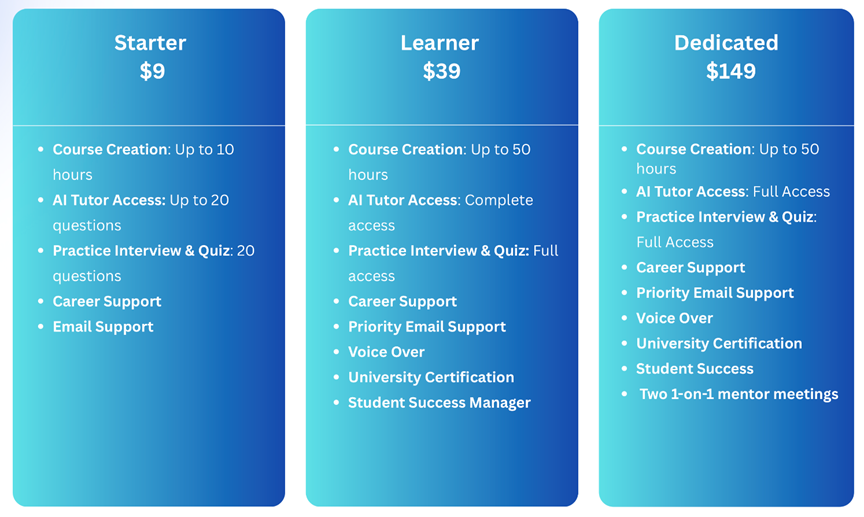AI-Powered Personalized Learning Platforms: How Generative AI is Reshaping Corporate Training
October 02, 2025 | | min read
Artificial intelligence (AI) is transforming the way organizations design, deliver, and measure corporate learning. AI-powered personalized learning platforms leverage generative AI to create tailored courses, adapt content in real time, and optimize learning outcomes for diverse employee needs.

Artificial intelligence (AI) is transforming the way organizations design, deliver, and measure corporate learning. AI-powered personalized learning platforms leverage generative AI to create tailored courses, adapt content in real time, and optimize learning outcomes for diverse employee needs. This article examines how generative AI automates course creation, the specific benefits for corporate training, and the advanced capabilities of Leveragai, a platform at the forefront of this shift. It explores automated content generation features, integration potential, and pricing considerations, while drawing on recent developments in AI-assisted education. Real-world testimonials illustrate measurable impacts on engagement and productivity. As companies face rapid skill gaps and evolving market demands, AI-driven personalization is emerging not just as a convenience, but as a strategic imperative.

Understanding AI-Powered Personalized Learning Platforms
AI-powered personalized learning platforms are digital systems that use machine learning algorithms often enhanced by generative AI to deliver individualized educational experiences. Unlike static e-learning modules, these platforms analyze learner data such as prior knowledge, performance metrics, and engagement patterns to adapt content dynamically (Chen et al., 2023).
Generative AI, a subset of AI capable of producing new content from learned patterns, enables these platforms to create entire courses in minutes. This is not a matter of rearranging existing materials; it involves generating original text, quizzes, multimedia assets, and even scenario-based simulations tailored to specific roles or industries.
How Generative AI Creates Courses
Generative AI models, such as large language models (LLMs), are trained on vast datasets of educational content, corporate documentation, and industry-specific materials. When prompted, they synthesize this knowledge into coherent, structured courses.
For example, a manufacturing company needing safety compliance training can input key requirements and workplace scenarios into an AI platform. The system can then produce:
- Table of contents conforming to user prompt.
- Learning objectives aligned with regulatory standards.
- Step-by-step modules with interactive elements.
- Assessments that adapt in difficulty based on learner performance.
This process can reduce course development timelines from weeks to hours, freeing instructional designers to focus on refinement and contextual accuracy rather than initial content creation.
Corporate Training Benefits
The corporate training sector faces two pressing challenges: rapidly evolving skill requirements and diverse learner profiles. AI-powered personalized learning platforms address both.
- Scalability without loss of personalization: AI can deliver individualized learning paths to thousands of employees simultaneously.
- Continuous content updates: Generative AI can refresh course materials as regulations, technologies, or best practices change.
- Data-driven insights: Learning analytics pinpoint skill gaps and recommend targeted interventions.
- Increased engagement: Personalized pacing and content relevance improve completion rates and knowledge retention.
- Bring your own content: Upload existing training materials, documents, or resources, and Leveragai's AI transforms them into interactive, personalized courses, no need to start from scratch.
- Video and animation integration: Create engaging visual learning experiences with built-in video support and animations that bring complex concepts to life and keep learners engaged.
A case in point: A global financial services firm implemented an AI-powered platform to train compliance officers across multiple regions. By tailoring examples to local regulations and cultural contexts, the firm reduced training time by 30% while improving assessment scores by 18%.
Automated Course Creation Features
Modern AI learning platforms offer a suite of automated features designed to streamline instructional design:
- User prompts: Users describe desired course outcomes, and the AI generates structured modules.
- Multimedia integration: Automatic creation of visuals, infographics, and even voice-over narration.
- Adaptive assessments: Tests evolve in real time based on learner responses.
- Localization: Instant translation and cultural adaptation for global teams.
- Compliance alignment: AI cross-references content with relevant regulations and standards.
These features not only accelerate production but also ensure courses remain relevant and compliant across contexts.
Leveragai: Capabilities and Differentiators
Leveragai positions itself as a full-stack AI-powered learning platform for enterprises. Its core differentiators include:
- Generative course builder: Converts corporate documentation, SOPs, or even meeting transcripts into structured training modules.
- Skill gap analytics: Integrates with HR systems to map employee competencies against organizational needs.
- Continuous learning loops: Updates course content automatically based on new data or feedback.
- LMS integrations: Connects with LMS platforms, collaboration tools, and knowledge bases.
Leveragai’s interface emphasizes simplicity, allowing non-technical HR staff to generate sophisticated courses without coding or instructional design expertise.
Pricing and Demo Availability
Leveragai offers tiered pricing based on organizational size and usage volume. Entry-level plans cater to small teams with limited course creation needs, while enterprise packages include advanced analytics, API access, and unlimited course generation. Pricing is typically subscription-based, with monthly or annual billing options.

Prospective clients can request a demo via Leveragai’s website, where the platform generates a sample course in real time based on user input. This hands-on preview often serves as a persuasive tool for decision-makers evaluating ROI.
Conclusion
AI-powered personalized learning platforms represent a significant evolution in corporate training. By harnessing generative AI, organizations can create tailored, adaptive courses at unprecedented speed, aligning learning initiatives with business objectives. Leveragai exemplifies this shift, offering automation, analytics, and integration capabilities that address both operational efficiency and strategic talent development.
As skill requirements evolve faster than traditional training cycles can accommodate, AI-driven personalization is poised to become a core competency for competitive enterprises. The challenge will be ensuring that automation complements—not replaces—human expertise in instructional design, cultural nuance, and ethical oversight.
References
- Chen, X., Xie, H., & Hwang, G. J. (2023). A review of artificial intelligence in education: Applications and challenges. Educational Technology & Society, 26 (1), 1–14. https://www.j-ets.net

